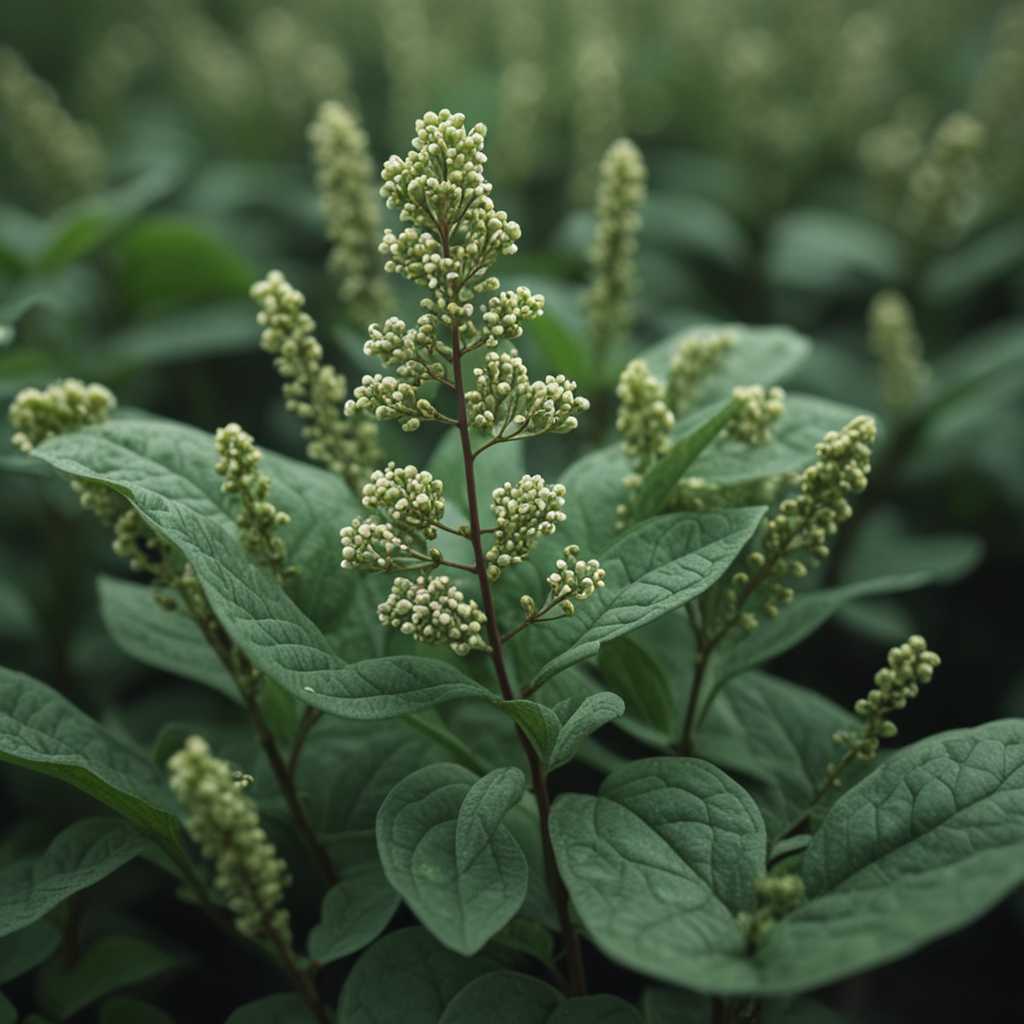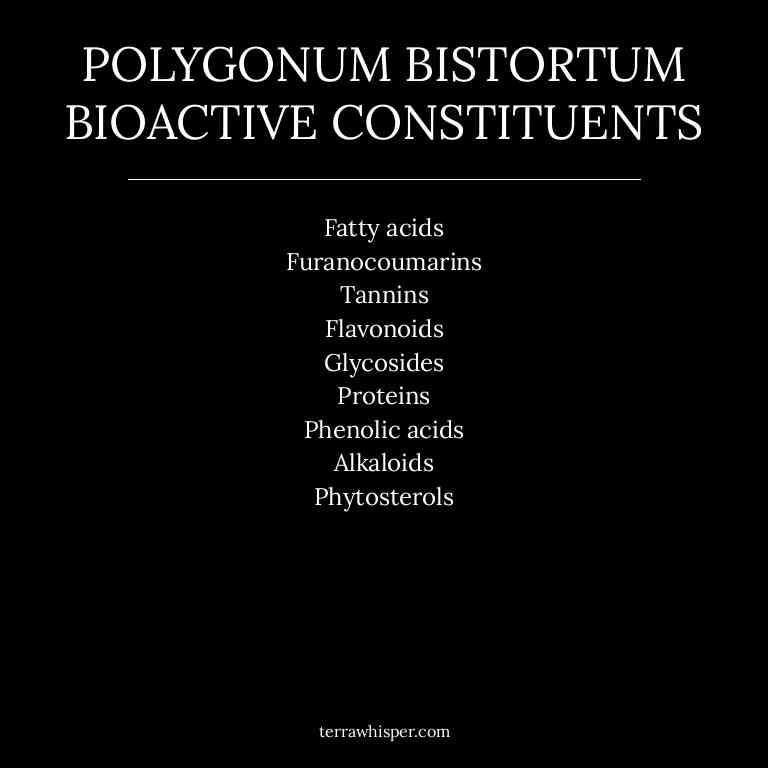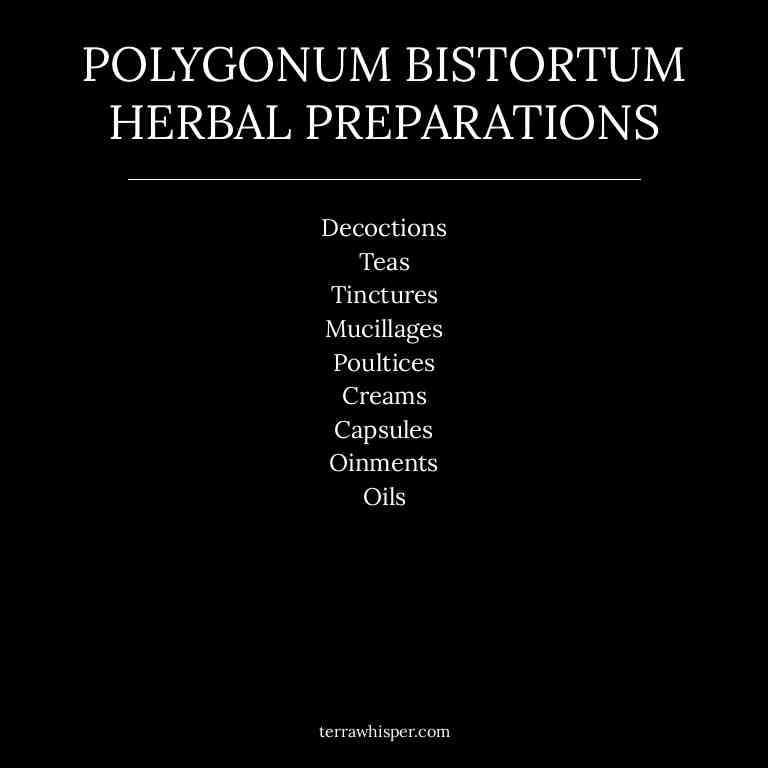Polygonum Bistortum Uses, Benefits, And Remedies

Polygonum bistortum, commonly known as bistort, is a perennial herb native to Europe and parts of Asia, characterized by its reddish stems and arrow-shaped leaves.
This herb is valued for its ability to support digestive health, reduce inflammation, and promote detoxification.
The bioactive constituents in bistort include tannins, flavonoids, and alkaloids, which contribute to its astringent, anti-inflammatory, and antimicrobial properties.
It can be prepared as an infusion, decoction, or tincture, and is often used in traditional herbal medicine for its therapeutic benefits.
This page analize the most important medicinal aspects of Polygonum bistortum.
- Health Benefits
- Bioactive Constituents
- Medicinal Parts
- Herbal Preparations
- Side Effects of polygonum bistortum
Health Benefits
Polygonum bistortum reduces fever quickly due to its high concentration of antipyretic compounds such as flavonoids and alkaloids, which inhibit the production of prostaglandins that raise body temperature.
It reduces inflammation quickly because it contains anti-inflammatory agents like tannins and polyphenols that suppress the activity of inflammatory cytokines and inhibit the production of reactive oxygen species. It cures fungal infections due to its antimicrobial properties, particularly its ability to inhibit the growth of Candida and other fungal species through the disruption of their cell membranes. It eases digestion issues by stimulating the secretion of digestive enzymes and promoting the movement of food through the gastrointestinal tract, thereby improving nutrient absorption and reducing bloating.
It heals wounds faster because of its rich content of antioxidants and wound-healing compounds that promote cell regeneration and prevent infection.
The 10 best health benefits of Polygonum bistortum are shown in the image below.

The list below give a brief description of the 10 best health benefits of Polygonum bistortum.
- Reduces Fever Quickly: Polygonum bistortum herb is known to help lower body temperature, making it effective in reducing fever swiftly.
- Reduces Inflammation Quickly: The herb contains anti-inflammatory compounds that help reduce swelling and irritation in the body.
- Cures Fungal Infections: Polygonum bistortum has antifungal properties that can help eliminate fungal infections such as athlete's foot and ringworm.
- Eases Digestion Issues: It aids in improving digestion by promoting the secretion of digestive enzymes and reducing bloating and discomfort.
- Heals Wounds Faster: The herb is rich in antioxidants and antimicrobial properties that help accelerate the healing of wounds and prevent infections.
- Treats Eye Infections: Polygonum bistortum can be used to treat eye infections due to its antibacterial and anti-inflammatory effects.
- Soothes Cold Sores: The herb's antiviral properties help in reducing the symptoms of cold sores and promoting faster healing.
- Soothes Ear Infections: It has antimicrobial and anti-inflammatory properties that can help alleviate symptoms of ear infections.
- Eases Menstrual Cramps: Polygonum bistortum can help relieve menstrual cramps by reducing uterine inflammation and promoting smooth muscle relaxation.
Bioactive Constituents
Polygonum bistortum fatty acids play a significant role in the herb's medicinal properties, contributing to its anti-inflammatory and skin-protective effects.
These fatty acids, which include compounds like linoleic and oleic acid, help in maintaining the integrity of cell membranes and reducing oxidative stress. In addition to fatty acids, Polygonum bistortum contains furanocoumarins, which are known for their phototoxic and antifungal properties, making them valuable in treating skin conditions and fungal infections.
The herb also contains tannins, which have astringent properties that aid in reducing inflammation and promoting wound healing. Lastly, flavonoids present in Polygonum bistortum exhibit antioxidant and anti-inflammatory activities, supporting overall health and immune function.
Together, these constituents make Polygonum bistortum a versatile herb with a wide range of therapeutic applications in traditional and modern medicine.
The 9 best bioactive constituents of Polygonum bistortum are shown in the image below.

The list below give a brief description of the 10 best bioactive constituents of Polygonum bistortum.
- Fatty Acids: Fatty acids are essential components of cell membranes and play a role in energy storage and hormone production.
- Furanocoumarins: Furanocoumarins are organic compounds known for their phototoxic properties and potential anti-inflammatory effects.
- Tannins: Tannins are astringent compounds that can help in reducing inflammation and may have antimicrobial properties.
- Flavonoids: Flavonoids are antioxidant compounds that may help protect cells from damage and support overall health.
- Glycosides: Glycosides are compounds composed of a sugar molecule attached to a non-sugar component, often with medicinal properties.
- Proteins: Proteins are essential macromolecules that play critical roles in the structure, function, and regulation of the body's cells.
- Phenolic Acids: Phenolic acids are antioxidants that may help reduce oxidative stress and have anti-inflammatory effects.
- Alkaloids: Alkaloids are nitrogen-containing compounds that often have significant physiological effects on humans and animals.
- Phytosterols: Phytosterols are plant-derived compounds that may help lower cholesterol levels and support cardiovascular health.
Medicinal Parts
Polygonum bistortum root is a key medicinal part of this plant, valued for its rich content of alkaloids, tannins, and starch.
It has been traditionally used in Chinese medicine to treat conditions such as diarrhea, dysentery, and inflammation due to its astringent and antimicrobial properties. The root's ability to reduce intestinal bleeding and soothe gastrointestinal irritation makes it an important component in herbal formulations. Additionally, it is believed to help in managing symptoms of hemorrhoids and other rectal disorders.
The leaf of Polygonum bistortum is also utilized in traditional medicine, often for its cooling effects and ability to promote wound healing, though its medicinal use is less prominent compared to the root.
Herbal Preparations
Polygonum bistortum decoctions are commonly prepared by simmering the dried roots or rhizomes in water for an extended period, allowing the active compounds to be extracted.
This method is often used to harness the herb’s purported anti-inflammatory and detoxifying properties. Decoctions are typically consumed as a warm beverage, either on their own or combined with other herbs. They are particularly valued for their ability to support digestive health and may be used in traditional medicine to address issues like bloating or indigestion.
In addition to decoctions, Polygonum bistortum is also used in teas, tinctures, and poultices, each offering unique benefits depending on the intended therapeutic application.
The 10 best herbal preparations of Polygonum bistortum are shown in the image below.

The list below give a brief description of the 10 best herbal preparations of Polygonum bistortum.
- Decoctions: Decoctions of Polygonum bistortum are used to support digestive health and alleviate symptoms of gastrointestinal disorders due to their astringent and anti-inflammatory properties.
- Teas: Polygonum bistortum tea is traditionally used to reduce inflammation, support urinary tract health, and promote diuresis due to its mild diuretic and anti-inflammatory effects.
- Tinctures: Tinctures of Polygonum bistortum are valued for their ability to support kidney function, reduce edema, and promote detoxification due to their potent astringent and diuretic properties.
- Mucillages: Mucillages from Polygonum bistortum are used to soothe irritated mucous membranes, support digestive health, and act as a natural demulcent for coughs and sore throats.
- Poultices: Poultices made from Polygonum bistortum are applied externally to reduce inflammation, soothe skin irritations, and promote healing of wounds and infections.
- Creams: Polygonum bistortum creams are used topically to reduce inflammation, soothe skin conditions, and provide a cooling effect for minor burns and rashes.
- Capsules: Capsules of Polygonum bistortum are used internally to support kidney function, reduce edema, and promote detoxification due to their diuretic and astringent properties.
- Oinments: Oinments made from Polygonum bistortum are applied externally to treat skin conditions, reduce inflammation, and provide antiseptic properties for minor infections.
- Oils: Oils infused with Polygonum bistortum are used to support skin health, reduce inflammation, and promote healing of wounds and minor skin irritations due to their soothing and antiseptic properties.
Side Effects of polygonum bistortum
Polygonum bistortum triggers nausea due to its high concentration of irritant compounds that stimulate the chemoreceptor trigger zone in the brain.
Polygonum bistortum induces vomiting as these same compounds can overstimulate the gastrointestinal tract, leading to reflexive vomiting. Polygonum bistortum causes stomach upset because its active ingredients can increase gastric motility and reduce the protective mucus layer in the stomach.
Polygonum bistortum results in diarrhea as it can accelerate intestinal movement and disrupt the normal absorption of fluids in the digestive tract.
The 11 most common side effects of Polygonum bistortum are shown in the image below.

The list below give a brief description of the 11 most common side effects of Polygonum bistortum.
- Triggers Nausea: May cause a feeling of sickness in the stomach, often accompanied by the urge to vomit.
- Induces Vomiting: May lead to the forceful expulsion of stomach contents as a response to the herb's effects.
- Causes Stomach Upset: May result in discomfort, bloating, or cramping in the abdominal area.
- Results In Diarrhea: May cause frequent, loose, or watery bowel movements due to gastrointestinal irritation.
- Leads To Skin Rash: May cause an itchy or red rash on the skin due to an allergic or inflammatory response.
- Causes Dizziness: May lead to a sensation of lightheadedness or unsteadiness, potentially due to systemic effects.
- Leads To Headache: May cause pain or pressure in the head, possibly due to vasodilation or other physiological responses.
- Triggers Allergic Reaction: May provoke an immune response, leading to symptoms like itching, swelling, or difficulty breathing.
- May Cause Fatigue: May result in a general lack of energy or weakness, possibly due to systemic effects on the body.
- Induces Heart Palpitations: May cause an irregular or rapid heartbeat, potentially due to stimulatory effects on the cardiovascular system.
- Causes Throat Irritation: May lead to a sore or scratchy sensation in the throat, possibly due to mucosal irritation.